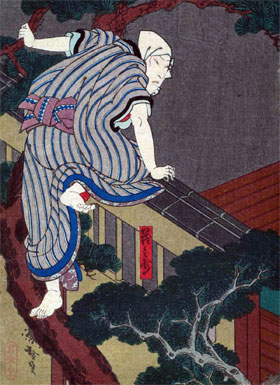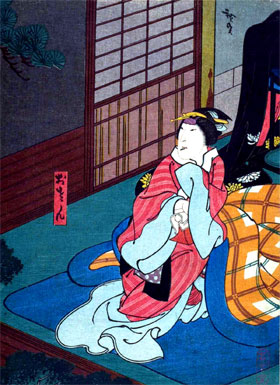| OSAN MOHEI |
| Play titles | Daiky˘ji Mukashi Goyomi Daiky˘ji Koi Hakke Hashira Goyomi Osan Mohŕ |
| Authors | Chikamatsu Monzaemon (1715 "Daiky˘ji Mukashi Goyomi") Namiki Sh˘z˘ I (1762 "Koi Hakke Hashira Goyomi") Kema Nanboku (1952 "Daiky˘ji Mukashi Goyomi") Kawaguchi Matsutar˘ (1954 "Osan Mohŕ") |
| History |
This play is based on a real case of adultery affair, which happened during the first half of the 1680s and led to the death penalty for three people, Mohŕ, Osan and Otama, who were executed by crucifixion (Mohŕ, Osan) or beheading (Otama) the 22nd day of the 9th lunar month of 1683 [1]. It was dramatized for the puppet theater (Bunraku) by Chikamatsu Monzaemon 32 years after their death and staged in ďsaka at the Takemotoza in Spring 1715. It was immediately adapted for Kabuki, entitled "Daiky˘ji" and staged in ďsaka at Shioya Kuroemon's theater at almost the same time. It was the kiri ky˘gen of the new year drama "Kami Ikusa Shirushi no Banjaku" [casting]. The puppet drama was revived in the 11th lunar month of 1740 in ďsaka at the Takemotoza, where it was staged under the new title "Koi Hakke Hashira Goyomi" to commemorate the 16th anniversary (17th memorial service) of the passing away of Chikamatsu Monzaemon. This title was reused in Kabuki by Namiki Sh˘z˘ I for his revision of Chikamatsu Monzaemon's drama, which was staged in the 5th lunar month of 1762 in ďsaka at the Kado no Shibai [more details]. In modern times, the playwright Kema Nanboku revised Chikamatsu Monzaemon's drama. It was premiered in November 1952, in T˘ky˘ at the Kabukiza [casting]. A few years later, Kawaguchi Matsutar˘ wrote another revision of Chikamatsu Monzaemon's drama, which was entitled "Osan Mohŕ" and was staged in December 1954 at the Meijiza [casting]. |
| Structure |
"Daiky˘ji Mukashi Goyomi" was originally made up of 3 acts. |
| Key words |
Awataguchi Bant˘ Chikamatsu San Kantsűmono Daiky˘ji Gidayű Ky˘gen Kantsű Kantsűmono Okazaki Sewamono Tanba Tedai Torite |
| Summary |
At the House of the Almanac Maker Ishun The house of the daiky˘ji Ishun, located in Ky˘to in Shij˘-Karasuma, is extremely busy, for it is the 1st day of the 11th lunar month, the first day for the distribution of the official almanac for the coming year and all the employees are engaged in the dispatch of the new almanacs. Ishun himself, however, is taking a nap because he is tired. He has visited the Imperial Palace, princes and nobles mansions to distribute the new almanac. The bant˘ Sukeemon, accompanied by a tedai, leaves the house to make a further distribution. With all employees gone, Osan, Ishun's wife, fondles her female pet cat while the maid, Otama, looks on. The cat struggles, scratches Osan's hand and escapes. Osan calls after the cat and runs off in pursuit of her. Otama is about to follow her when Ishun suddenly wakes up and tries to embrace her. Otama struggles and warns Ishun that she will call Osan if he does not release her. At the same time, Osan's mother arrives unexpectedly at the house. Ishun can't stay any longer and he goes away. Osan returns to receive her mother and leads her into an inner room. The tedai Mohŕ returns from a visit to customers. He is a little bit drunk as his customers have offered him to drink some sake. Osan comes to his side and confidentially asks him for help because her father is in financial difficulty. She wants to borrow money for a few weeks. She says her father is reluctant to ask Ishun's help because the almanac maker is greedy and it would embarrass Osan herself. Mohŕ, who is a young and easily impressionable young man (fascinated by the beautiful wife of his master), immediately volunteers to help Osan, who gladly goes away to report the good piece of news to her mother. Mohŕ was well intentioned but he has no money of his own at all. He quickly has a plan to borrow the money from a wholesaler in his master's name. He therefore draws a bill of exchange, affixing Ishun's seal to the forged document. This act is detected by the bant˘ Sukeemon, who has just returned. Sukeemon calls all in the house, including Ishun, and beats Mohŕ in their presence. Unable to reveal his true motive however, Mohŕ keeps silent though Ishun persistently demands his explanation. To save Mohŕ from further punishment, Otama falsely testifies that she has asked Mohŕ for a loan because her uncle has written her that he will commit suicide because he cannot pay off a long-standing debt. Osan and her mother, who have watched the interrogation of Mohŕ in fear of his revelation of the real reason, beg Ishun to pardon Mohŕ, but Ishun gets angrier than ever. Saying he will try Mohŕ the following day, Ishun orders to lock up the young man. Ishun invites Osan's mother to stay overnight at his home and leaves to visit Osan's father to tell him what has happened. After all have gone to bed, Osan stealthily visits Otama's room in order to thank her for her quick-witted help. Otama confides to Osan that she has acted out of love for Mohŕ. She also tells Osan of Ishun's persistent amorous advances to her. This, she says, is the reason why he became angrier when she offered her help to Mohŕ. This was the proof that the love she refused Ishun was reserved for Mohŕ. Otama also reveals that, every evening, Ishun goes out on some excuse and after all have gone to bed, secretly climbs over the fence of his own house and sneaks into Otama's bedroom. So far she has successfully rejected his advances by threatening to call his wife. But his announced departure to the house of Osan's father today is most probably yet another excuse to absent himself from his own room so that he may visit hers again. This revelation makes Osan both angry and jealous. Wishing to put her husband to shame, she asks Otama to exchange their bedroom for the night. She also exchanges her night clothes with Otama's. No sooner has Otama left for Osan's bedroom than Mohŕ comes in. He has broken out of confinement and has come to express his gratitude and to return her love to Otama. Mohŕ and Osan are unaware of getting the wrong person. They share the same bed in the dark without a word, each mistaking the other for another person. Late at night Ishun comes back and violently knocks at the door. Sukeemon wakes up and light a lantern to receive him. The light causes Osan and Mohŕ to discover themselves and to be themselves discovered by both Sukeemon and Ishun. Bairyű's House in Okazaki Sukeemon visits at night the house of Akamatsu Bairyű, a r˘nin and professional story-teller. He is also Otama's uncle. Sukeemon comes with a palanquin carrying Otama tied with a rope. When Sukeemon asks Bairyű to keep Otama in his custody, Bairyű accuses Sukeemon of binding her without authority. He takes over Otama only after he has beaten Sukeemon with a pole and made him undo the rope binding her. Sukeemon, muttering revenge, is carried away in the palanquin. Osan and Mohŕ, who fled from Ishun's house when their adultery was discovered, come to the front of Akamatsu Bairyű's house and, eavesdropping on the conversation within the house, hear Bairyű advising Otama to accept execution with good grace since she cannot be exonerated from the charge of having helped the adultery. The lovers listen silently and weep. Osan's father and his wife are on their way to a Buddhist temple. They find Osan and Mohŕ on the road. The father gets very angry but, out of pity, his wife gives the two lovers money to help them escape to Mohŕ's hometown in Tanba Province. The Lovers' Hideout in the Tanba Province On the first Day of the New Year, some street entertainers sing a song in front of the hideout of Osan and Mohŕ in the Tanba Province. As Osan gives some money to the leader, he recognizes her as Ishun's wife, for he has frequently visited Ishun's house in Ky˘to. Osan bribes him with more money and asks him not to tell anyone about her presence. Mohŕ comes back from a visit to a local shrine and tells Osan that he has heard that police have come from Ky˘to to arrest them. They begin preparations to flee when some torite arrive and arrest them. Sukeemon comes and asks the government official directing the torite to turn over the couple to him but is scolded by him for making a preposterous request. Akamatsu Bairyű arrives at the hideout with a box containing Otama's severed head and asks the official to pardon Osan and Mohŕ, saying that Otama alone is to blame because she was the one who caused them to commit adultery by mistake. He has punished her himself. The official tells Bairyű that he feels sorry for Bairyű's rash act. Otama can't testify anymore in favor of Osan and Mohŕ in the court to help establishing the innocence of Osan and Mohŕ. Bairyű, extremely mortified, turns his anger at Sukeemon. Unsheathing his sword, he slashes at Sukeemon but is interrupted by people around him. The two lovers are tied to be brought to the execution ground in Awataguchi near Ky˘to. Weeping, they are ready to ride to their doom. |
| Trivia |
Mizoguchi Kenji's 1954 masterpiece movie "The Crucified Lovers" (original title "Chikamatsu Monogatari", literally "Chikamatsu's Tale") was based on the script made by Kawaguchi Matsutar˘. The title "Daiky˘ji Mukashi Goyomi" was used for the first time in Kabuki in the 5th lunar month of 1815, in Nagoya at the Seijuin no Shibai. The roles of Mohŕ, Osan, the daiky˘ji Ishun, Otama, the bant˘ Sukeemon and Akamatsu Bairyű were played by Arashi Kichisabur˘ II, Sawamura Tanosuke II, Ogawa Kichitar˘ III, Arashi Tomisabur˘ II, Arashi Kanjűr˘ I and Nakayama Raisuke IV. |
| Notes |
[1] The 22nd day of the 9th lunar month of the 3rd year of the Tenna era was the 10th of November 1683 in the western calendar. |
 |
 |
|
The actors Kataoka Gad˘ II and Nakamura Daikichi III playing the roles of Mohŕ and Osan in the drama "Daiky˘ji Mukashi Goyomi", which was staged in the 10th lunar month of 1850 at the Chikugo no Shibai (print made by Utagawa Hirosada) |
|
|
|
| Contact | Main | Top | Updates | Actors | Plays | Playwrights | Programs | Links | FAQ | Glossary | Chronology | Illustrations | Prints | Characters | Derivatives | Theaters | Coming soon | News |